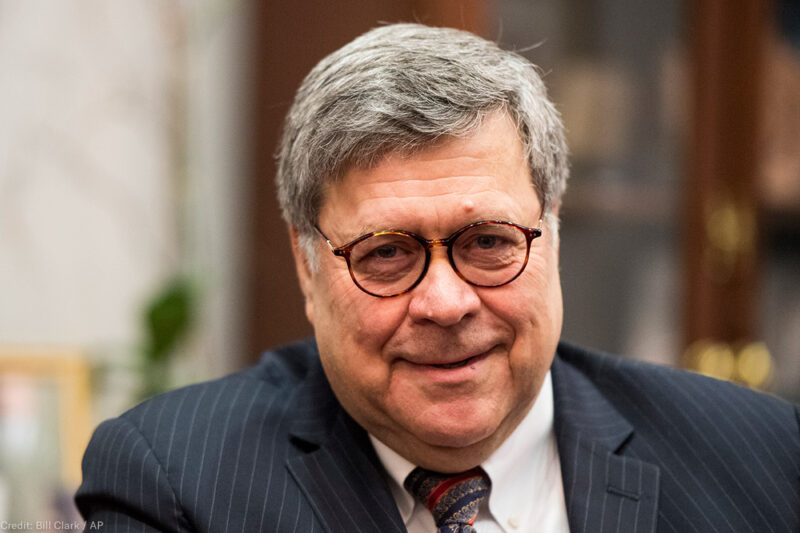
This piece originally ran at .
Discussing the origins of the FBIÔÇÖs Russia investigation, Attorney General William Barr recently claimed that ÔÇ£.ÔÇØ He went on to say, ÔÇ£I canÔÇÖt imagine any world where we wouldnÔÇÖt take a look and make sure that was done properly.ÔÇØ
As some were , the comments were rich coming from an architect of our governmentÔÇÖs modern spying apparatus: As attorney general during the George H.W. Bush administration, Barr played a key role in developing a secret program that served as the for the NSAÔÇÖs mass surveillance of AmericansÔÇÖ phone records.
But the hypocrisy of BarrÔÇÖs comments goes well beyond his past. On Thursday, lawyers from BarrÔÇÖs Justice Department tried to block a federal court from taking a look at the governmentÔÇÖs surveillance of Americans.
The caseÔÇöbrought by the Wikimedia Foundation, which runs Wikipedia, one of the worldÔÇÖs most-visited websitesÔÇöchallenges the constitutionality of the U.S. governmentÔÇÖs warrantless spying on AmericansÔÇÖ international internet communications, known as ÔÇ£UpstreamÔÇØ surveillance. (The └¤░─├┼┐¬¢▒¢ß╣¹, Knight First Amendment Institute, and Cooley LLP are representing Wikimedia in this challenge.)
With the help of companies like AT&T and Verizon, the National Security Agency conducts surveillance on U.S. soil by tapping directly into the internetÔÇÖs backboneÔÇöthe physical infrastructure that carries our emails, photos, personal chats, and web browsing. The agency then copies and searches a vast pool of internet communications flowing into and out of the United States. It does all of this without a warrant, in violation of the Fourth Amendment.
WikimediaÔÇÖs case could mark the first time a public court weighs in on the constitutionality of this decade-old spying operation. But in stark contrast to BarrÔÇÖs public expressions of concern over the privacy of Americans, his Justice Department has thrown up a series of litigation roadblocks in an effort to prevent the court from ruling on the legality of this surveillance dragnet.
In fact, on Thursday, Justice Department lawyers argued that WikimediaÔÇÖs case should be dismissed outright. They contend that Wikimedia cannot prove with sufficient certainty that its communications are surveilled, and that it therefore lacks ÔÇ£standingÔÇØ to sue.
But Wikimedia is plainly subject to warrantless surveillance. Wikimedia engages in more than 1 trillion international internet communications per year, with users in every country on earth. Because those communications are so numerous and so broadly dispersed across the globe, they travel every path carrying internet traffic into and out of the U.S. Even if the NSA is monitoring just one of those paths, it is monitoring WikimediaÔÇÖs communications. The governmentÔÇÖs own disclosures about the scope of its surveillance make this clear.
In response to WikimediaÔÇÖs lawsuit, the Justice Department is relying on a legal tactic called the ÔÇ£state secrets privilegeÔÇØ to try to block the court from considering several of the governmentÔÇÖs official disclosures. The Justice DepartmentÔÇÖs argument rests on the theory that the courtÔÇÖs consideration of this information would harm national securityÔÇöeven though the government has already declassified and released the same information to the public.
Incredibly, the Justice Department also asserts that the court cannot even rule on WikimediaÔÇÖs standing without harming national security, despite the fact that Congress created a special procedure in the Foreign Intelligence Surveillance Act to address this concern. The procedure is designed to account for any conflict between legitimate secrecy and accountability, and it allows lawsuits like this one to go forward.
If the court in WikimediaÔÇÖs suit accepts the Justice DepartmentÔÇÖs state secrets arguments, it would have far-reaching implications. In essence, it would mean that only the executive branch can decide how and when lawsuits challenging government surveillance may proceedÔÇöand that the government could unilaterally block courts from taking the very ÔÇ£lookÔÇØ that Barr says is necessary. That view of executive branch power is completely at odds with what Congress intended when it enacted FISA, and it could eviscerate the possibility of meaningful accountability for unlawful spying.
WikimediaÔÇÖs communications with its users are sensitive and private. They can reveal intimate information about usersÔÇÖ political affiliations, religious beliefs, medical questions, and personal interests. Just as the government shouldnÔÇÖt be monitoring the reading habits of ordinary library patrons, it shouldnÔÇÖt be monitoring what WikimediaÔÇÖs users are privately reading online.
If Barr really wants to champion accountability for violations of AmericansÔÇÖ privacy, he should stop trying to shut the courthouse doors on Wikimedia. ItÔÇÖs past time for the public courts to review the legality of the NSAÔÇÖs surveillance of our internet communications.

